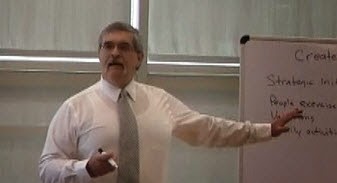Being the best in whatever you do is what maximum performance is all about. But being the best rarely occurs as an unplanned spontaneous event. And simply wishing for it lacks any real potential for fulfillment. Being the best requires vision and desire, which are the primary ingredients for potential. And potential becomes reality when it is supported by consistent, motivated, goal-based performance, along with strong coaching.
Prepare your brain
Being the best begins at the start of every day. It means rising early and getting your body and mind in gear. Early morning is when the brain is prepared to operate at its maximum efficiency. It has not yet been clouded by events that evolve during the course of the day and, unless the person has been consumed by worries during the night, the brain is ready to deliver to the best of its capabilities.
Three things that can help the brain to be its best are allowing for some type of "quiet time" devoted to reflection or creativity, followed by physical exercise and then proper nutrition. No matter how motivated an individual is, their maximal performance and ability to attain goals and exceed expectations will always be enhanced through exercise of the body and the brain, accompanied by proper nutrition.
Potential clients are always more likely to listen to someone who is motivated and fit. The positive impact of a healthy lifestyle are sold short in the business world. True emotional selling comes from an individual's self concept projected to the potential customer. The self concept is exemplified by appearance, motivation and demeanor.
Pursue integrity with vigor
An individual who wants to be the best needs to be an evangelist for integrity. Whenever a potential customer has a question and is answered with ambiguity, or even worse, half-truths or false information, it is an unacceptable disgrace. Maximal performance must never include deception.
Rely on goals
Another essential component to being the best is to review your goals daily and focus on strategies to enhance performance. All goals should be written down in order to make them visual. The adage, "Anything the mind can conceive and believe, it can achieve," is true.
Setting and attaining goals is related to commitment. For someone to consistently attain and/or exceed their goals, they must be motivated from their heart as well as their brain. True success is more emotional than cerebral. The brain must believe that the individual can attain the goals, which is cerebral, but the actual attainment of the goals comes from an emotional commitment that will not allow for failure.
Too many lightly dismiss failure to attain their goals as no big deal. They say, "I'll do better next time!" which is the right cerebral commitment, but it also accepts the failure to attain the goals and sets the failure cycle in motion. The failure cycle is easy to recognize. The "I'll do better next time!" statement is repeated for a period of time until it becomes distinguishably distasteful, and the terminal disease of negativity begins to reveal itself to the individual and their coach.
Evaluate performance
The job of the business coach is to get the individual and the team on target at the beginning of the goal cycle and inspire them to stay on or ahead of target throughout the goal period. Failure to attain set goals is thus a mutually shared burden. Performance must be evaluated daily both by the individual through self-examination and by the coach to identify positive and negative trends and modify the methodology accordingly.
Maximum success can only occur when all of these ingredients are in place and the coach, the individual and the team work together effectively as a team with one goal in mind...to TRULY be the best.If you would like additional information on this issue, please feel free to contact me at: (865) 304-9409
Or e-mail: geoff@geoffhampton.org
